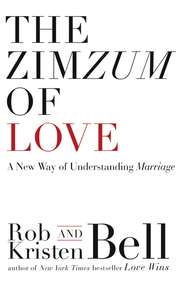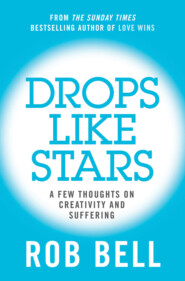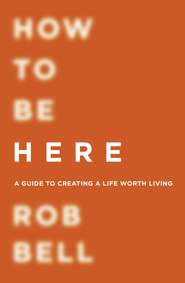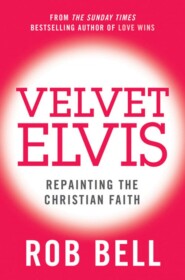По всем вопросам обращайтесь на: info@litportal.ru
(©) 2003-2024.
✖
The Love Wins Companion: A Study Guide For Those Who Want to Go Deeper
Автор
Год написания книги
2018
Настройки чтения
Размер шрифта
Высота строк
Поля
Do not be afraid. God can be trusted. You are free to love, to explore, to ask questions, to think. That is the invitation Rob Bell puts before us in Love Wins and now in The Love Wins Companion. We are invited to step outside of the boat and draw closer to the one who calls us and wants to be known. Do not be afraid. God appreciates our efforts and smiles at our failings. He loves our humor when we lighten our load and when we enjoy the presence of his Spirit in our lives. God is willing to be found—by anyone who is looking. That’s good news. And the password is love.
Preface (#ulink_841c8785-7c35-5dc6-9cde-1aab2c519ad8)
by Rob Bell
I’m thrilled that you are interested in going deeper into the ideas I present in Love Wins. A couple of thoughts before we get going.
First, some words out there in our culture have incredibly heavy emotional attachments to them, words like heaven, hell, judgment, salvation. You throw these words into a conversation, and people have strong opinions and ideas whether for or against, negative or positive. This is true especially when it comes to the Christian faith, and specifically when it comes to where people are with God, who has a relationship with God, who doesn’t, who’s a Christian, who’s not, who’s going to heaven, who’s going to hell.
One of the things that drives this book is my desire to simply say, “Here’s what the Bible says.” If some people are really, really passionate about a particular perspective, I want to know where they got that from. So when it comes to heaven and hell and judgment, what I’ve tried to do in the book is lay out what the Bible actually says, what Jesus said, and then, conversely, what Jesus didn’t say.
I believe that God loves everybody. And I believe that the heart of the Christian faith is this God who loves everybody, this Jesus who came to show us this love, give us this love, and invite us into this love. So, from my perspective, the Christian faith at its core is an experience of the love of God through this Jesus, who insists that God loves everybody, everywhere. As you read through this Companion, as you wrestle with the questions and go further into the ideas, as you look at this passage and that passage and that story, and as you recount your own experience or reflections, my wish is to create the space where you can meet this God and experience this God’s love.
I’m fascinated when Jesus talks about how he’s water. It’s hard to build a systematic theology around water. Try building a denomination around water; it’s very fuzzy and nebulous and ambiguous—unless, of course, you’re thirsty. Then you know exactly what the water is.
Or when Jesus says he’s light. Light can be hard to get your hands around; it can be hard to quantify or systematize—unless you know you’re far from home, and then light shows you how to return to the place from which you came.
Jesus speaks in metaphors and parables, because ultimately he comes to bring us a living, breathing experience of the love of God right here, right now. At the heart of this book is this simple, beautiful, compelling declaration that this love wins. So I hope this guide helps take you to places you haven’t been before, places that are thrilling and convicting, that fill you with wonder and awe. May the peace of God be with you the whole way.
When my publisher shared with me the idea for this companion guide and asked if I could suggest who should help put it together, my first thought was my friend of twenty years Dave Vanderveen. I was of course thrilled when he said he’d do it and then continually surprised with the fresh insights and people and ideas he has brought to this project.
We have found that a lot of people are preoccupied with the question, “Is there life after death?” That’s a good question, an interesting question, and one that has received a good deal of speculation and discussion. But that isn’t the question that Jesus came to answer.
He came to answer a better, more urgent, more pressing question: “Is there life before death?”
And to this question Jesus repeatedly, emphatically answered, “Yes!”
That insistence of Jesus—that we can have full, overflowing, vibrant, pulsating, dynamic life right now—is what Love Wins is about and it’s what this companion guide is about.
What’s possible right now?
What is God doing in the world right here in our midst?
What does the resurrection life Jesus gives us look like at this moment in time?
My hope is that as you discuss Love Wins you will find yourself returning to that question and that insistence over and over and over again. My prayer is that you are not sidetracked for any significant amount of time with questions that we cannot answer, because we are speculating about things that haven’t happened. My desire is that the book and now this companion will produce a profound sense of urgency and immediacy that there really is bread for the hungry and water for the thirsty and light for those who need to find their way home.
So here’s to the discussion.
Enjoy.
And now, a word from Dave.
How to Use This Companion (#ulink_bd0b2f09-18b7-5fb4-88e8-3a298926aadf)
by David Vanderveen
Some of the Pharisees said, “Obviously, this man can’t be from God. He doesn’t keep the Sabbath.” . . .
The man replied, “This is amazing! You claim to know nothing about him, but the fact is, he opened my eyes! It’s well known that God isn’t at the beck and call of sinners, but listens carefully to anyone who lives in reverence and does his will. That someone opened the eyes of a man born blind has never been heard of—ever. If this man didn’t come from God, he wouldn’t be able to do anything.” . . .
Jesus then said, “I came into the world to bring everything into the clear light of day, making all the distinctions clear, so that those who have never seen will see, and those who have made a great pretense of seeing will be exposed as blind.” (John 9:16, 30–33, 39, MSG)
When the blind are being healed, arguments about keeping the Sabbath seem absurd. They miss the point entirely. Jesus’s words are clear about those who cannot see the light, who refuse to look away from their own interests and their own doctrines when the good news shows itself in surprising ways among us.
We all wear filters, lenses, and, in some cases, blinders when we read the Bible. No one experiences the gospel message in a vacuum. When a book appears that generates dramatic and enthusiastic interest about the underlying truth of the good news of Jesus, it demands our attention. We need to make sure we are not like those pretending to see, but are actually blind. Being open to investigating and exploring what is before us helps prevent blindness.
The problem many of us face is how to really listen—particularly as we become more comfortable with the patterns and boundaries through which we interpret the world around us. Are we truly open to God’s surprises? Will we let God confront us in gut-wrenching ways with his good news? Will we let God break through our own ideas about who God is and to speak to us in fresh ways?
The most important thing for reading Love Wins and The Love Wins Companion isn’t discovering the “right” beliefs about Christianity or salvation. The important thing is seriously to engage the material in the books, really attempt to read them without running the ideas through the blinders you may have, before trying to discern what the Holy Spirit may be saying through these words. Those blinders might have come from a specific Christian tradition or from another faith or no faith, whether you call yourself a believer, agnostic, atheist, or just someone looking for ideas. Dive into Love Wins and look around. Engage the ideas and voices in The Love Wins Companion. They are for those who wish to see.
We recognize that people will have different purposes for reading this companion to Love Wins. Some will want to explore more deeply the ideas in Love Wins as individuals; some will want to do the same in a small group or even in a class. We have tried to make this as open-ended and flexible as possible for all these uses. Each chapter from the original book has a corresponding section in this companion that includes an overview and introduction by Rob Bell; a general introduction of the new material by me; Bible studies and exercises for study; discussion questions for groups; and, finally, related “readings” of articles, blogs, book excerpts, and interviews to explore more deeply the ideas from the original chapter.
To get the most out of this companion, we recommend following these principles to avoid “blindness” or unnecessary division:
1 Don’t be overly focused on ending up with the right answer. This worry often hinders our ability to hear the real question and wrestle with the issues. Relax, drop your preconceived objections, and try to respond directly just to the text in front of you. The goal of both books is for you to understand what the Bible actually teaches. In the end, you might not agree with everything these books say, but we want to make sure you truly hear the questions and ideas first in case God has something new to say to you.
2 Focus on loving the people you are discussing these issues with—regardless of their opinion or yours. This is the explicit teaching of scripture. “No matter what I say, what I believe, and what I do, I’m bankrupt without love” (1 Cor. 13:3, MSG).
3 Recognize that we all read the Bible through a lens and not in a vacuum. No one “just reads the Bible.” The church has been wrestling with these texts for two thousand years. There are dozens of major traditions and hundreds of minor ones that all read the biblical texts in certain ways. We are not saying the Bible is unclear or impossible to understand. But we are saying that you have filters that shape how you are reading the Bible. If you haven’t identified your lenses and filters, take some time to understand your own background, biases, and the history of the ideas that have shaped your own thought.
4 Make sure you distinguish ideas from the people who are expressing those ideas (including your own). Candid and strong discussion is powerful and beneficial when we don’t attack the people we are talking with. Debate the worthiness of the idea without infringing on the worth of the person.
5 Make peace with the reality that good Christians can disagree on important matters. This is another reason why it is important to separate critical comments about ideas from critical comments about people. Very bright and very devout people have a vast range of orthodox opinions that don’t always align.
6 Study the history of the idea you are defending. Many people are shocked to discover that what they thought was ancient Christian orthodoxy turns out to be a relatively recent development in the church or, conversely, what they considered a problem doctrine has been a standard orthodox view for centuries. That is why it is helpful to ask: How old is the idea in the history of the Christian tradition? Where did it originate? What was it responding to? What were the original arguments disputing it? Understanding these contextual issues allows us to appreciate both the limits of an idea and how adaptive doctrines have been to the issues and context of the church throughout the centuries.
Jesus specialized in taking religious people’s understandings about God and how everything works and then turning them on their heads. He wanted people to see that God was doing something new. In that vein, Love Wins stretches many of our preconceived ideas about Christianity for those both inside and outside the faith. Rob does this mostly by getting us to pay attention to what Jesus and his followers actually said. Embracing the biblical text with as much separation from our preexisting ideas and experiences as possible may offer some surprises about Jesus’s good news. Perhaps God is offering a bigger love than many of us have ever imagined.
Chapter One What About the Flat Tire? (#ulink_1cdc2528-38f5-5e7d-bfdf-c4185fc2beff)
Overview by Rob Bell (#ulink_48365c6f-830d-5484-b2b0-85c00423faa4)
Over the years I have met many people who are fascinated, compelled, or drawn to Jesus, but some reason or obstacle keeps them away. They may have heard from a Christian, “This is how it is, period, end of discussion. The Bible says it, so that settles it.” Or they might have been taught that to follow Jesus, they had to go down a certain road and believe certain things, some of which they found problematic. What I’m interested in in this chapter is the power of questioning and the experience of solidarity in finding you’re not alone—of always wondering, “But what about that?” and then finding out, “Oh, other people feel the same way.”
My interest here is that you get loosened up with the questions, that the questions pull out of you, “You’re right. That doesn’t make sense” or “You’re right. I’ve always had a problem with that explanation.” It’s okay. There should be no fear in the questioning and no hesitation in the asking. We can go there—that’s the power.
And the biblical tradition is actually filled with questions, all the way to Jesus on the cross: “My God, my God, why have you forsaken me?” Questions are actually one of the ways we meet the divine. My hope is that somewhere in here you find your own questions and you learn that you aren’t alone.
Going Deeper by David Vanderveen (#ulink_218c320f-b903-57b0-b65c-355b199bd636)
Many readers of chapter 1 of Love Wins are a little taken back by all the questions Rob throws at them about what it means to be “saved.” Rob is not trying to deny or criticize what Christians believe, but to reveal that our present understanding does not explain everything. Some churches suggest there is a specific process for getting “saved.” In this chapter, Rob explores a wide range of those techniques, some of which conflict, as well as a long list of ways that Jesus told people they were accepted. Our beliefs about God, Jesus, and the meaning of Jesus’s death and resurrection need to deepen in order for us to grasp more fully what the Bible means by “saved.”
Rob is not the first to raise these issues. In a 1997 interview of evangelist Billy Graham by televangelist Robert Schuller of the “Hour of Power,”[1] (#ulink_2d4298a6-8861-5578-afdb-ceb53d5b6631) the conversation was surprisingly broader than some Christians imagined it should be:
Schuller: Tell me, what do you think is the future of Christianity?
Graham: . . . I think everybody that loves Christ, or knows Christ, whether they’re conscious of it or not, they’re members of the Body of Christ. And I don’t think that we’re going to see a great sweeping revival that will turn the whole world to Christ at any time. I think James answered that, the Apostle James in the first council in Jerusalem, when he said that God’s purpose for this age is to call out a people for His name. And that’s what God is doing today. He’s calling people out of the world for His name, whether they come from the Muslim world or the Buddhist world or the Christian world or the nonbelieving world, they are members of the Body of Christ, because they’ve been called by God. They may not even know the name of Jesus, but they know in their hearts that they need something that they don’t have, and they turn to the only light that they have, and I think that they are saved, and that they’re going to be with us in heaven.











